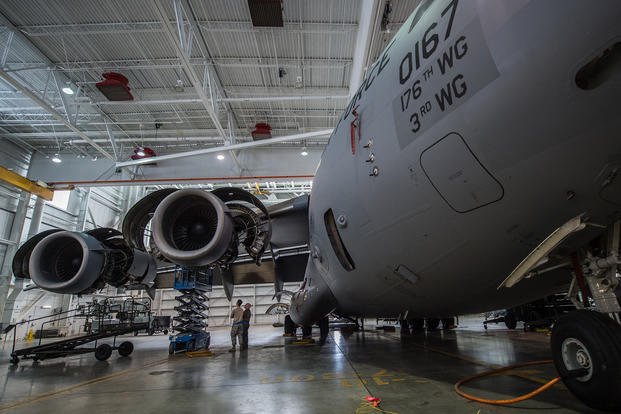A troubled Air National Guard unit is grappling with seemingly rampant misbehavior within its ranks, particularly among its noncommissioned officers, including sexist and racist discrimination, inappropriate jokes and a generally poor working environment. And its commander is telling the formation to shape up.
A command climate survey for the 176th Maintenance Squadron with the Alaska National Guard reported that 100% of the women who responded reported sexual harassment behaviors within the unit and high rates of gender-based mistreatment and exclusion. The survey, done last year, was part of a presentation marked as controlled unclassified information, a term used for unclassified but protected material, but was obtained by Military.com.
It also painted a pattern of poor performance from the squadron's noncommissioned officers and a culture of dysfunction -- racial discrimination, a lack of recognition and awards, discrimination based on sexual orientation, a chain of command set up in a way that's confusing to know who is in charge, a general pattern of poor communication between noncommissioned officers and subordinates, and administrative issues that go unresolved for months at a time.
Read Next: Air Force Investigating Death of Airman Who Set Himself on Fire as Gaza Protest, Chief of Staff Says
According to the presentation, 90 people responded to the survey. David Bedard, the 176th Wing spokesman, told Military.com in an emailed statement Thursday that the survey is designed to provide results as "anonymously as possible; therefore, the exact number of female respondents is not made available to the unit."
At the time of the survey, 12 of the 272 members in the 176th were female, Bedard told Military.com.
The 176th Wing is the overarching organization made up of approximately 1,500 airmen, including the 176th Maintenance Group, which encompasses the 176th Maintenance Squadron, according to the wing's website.
"These complaints have been centered around comments, jokes, attacks, or observations that run the gamut from sexual orientation, to racism, to religious freedom, to gender; all of which are unacceptable in the modern workplace," Col. Michael Cummings, the 176th Maintenance Group commander, wrote in a memo following the presentation, also marked as controlled unclassified information, to the force that was also obtained by Military.com.
"When I ask about this seemingly endless stream of complaints, I am told, 'It's just Maintenance. We are hard on each other. It's our culture," he added. "That can no longer be our culture."
The note was written in September, but this is the first time it has been publicized.
The survey, conducted last year, asked subordinates to rate the command team and give feedback on workplace culture. In response, all the women surveyed reported sexually harassing behaviors in the unit, and the majority of women reported gender-based discrimination.
"It's a good ol' boy club," one enlisted airman assigned to the squadron told Military.com on the condition of anonymity, because they were not authorized to speak to the media. "It's inappropriate jokes, racism. This is a cultural issue."
Despite the survey results and the commander's letter identifying a cultural problem, Bedard told Military.com that those don't relate to formal and specific complaints.
"Responses on the anonymous survey do not equate to actionable complaints; rather, they identify potential areas for concern within the command relating to the command climate," Bedard said. "Any complaint made to the 176th MXS leadership is thoroughly investigated, and appropriate disciplinary action is taken."
Bedard did not directly respond to the question when asked whether any supervisors or leadership -- some of whom were identified as "toxic" within the survey -- had been fired, reassigned or retired. He said that "there is a process of progressive discipline focused on performance improvement," adding that "potential administrative disciplinary action ranges from verbal and written counseling to potential removal."
Following the survey results, Bedard said, "Leadership briefed the unit during numerous commander's calls to ensure maximum dissemination of the results," which included a town hall, and additional legal resources were provided to airmen "in case they didn't feel comfortable airing their concerns to leadership during the feedback forum."
The widespread harassment reported within the 176th Maintenance Squadron mirrors larger Air Force trends that officials have been grappling with for years.
A 2021 Air Force Inspector General survey found widespread sexual harassment within the ranks, noting that one out of every three female military respondents and one out of every four female civilian respondents experienced sexual harassment during their time in the Air Force.
The 176th Wing traces its history back to 1969 as a tactical airlift group. Its mission has evolved to combat search and rescue, agile combat support for air expeditionary force tasking, and strategic airlift, according to the wing's website.
The 176th Maintenance Group and the 176th Maintenance Squadron keep the C-17A Globemaster III, HC-130J Combat King II and HH-60 Pave Hawk aircraft maintained, a high-tempo mission because the wing provides search-and-rescue and airlift operations across the globe, as well as a 24/7 search-and-rescue mission for the entire state of Alaska.
The state is widely considered among the most difficult environments for troops to operate, with frigid temperatures frequently dropping to minus-65 degrees Fahrenheit. Military bases are also so scattered and much of the state is so rural, part-time troops often have to travel long distances for duty.
Due to this high-stress mission, Cummings wrote in his leader memo that the ongoing harassment and culture are harming the 176th Maintenance Squadron's mission overall.
"These behaviors do not contribute to the mission, they detract from it," Cummings wrote. "Additionally, as we all know, the Guard is expected to do more with less than our active-duty partners. We cannot afford to have our staffless leadership continually tied up in the administrative monster that surrounds these complaints instead of focusing on the mission and their people."












